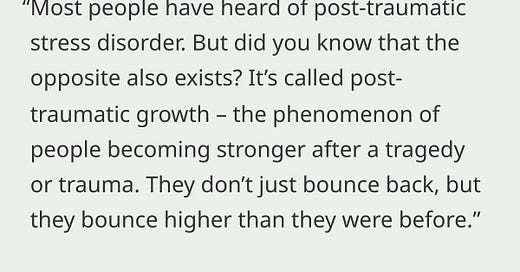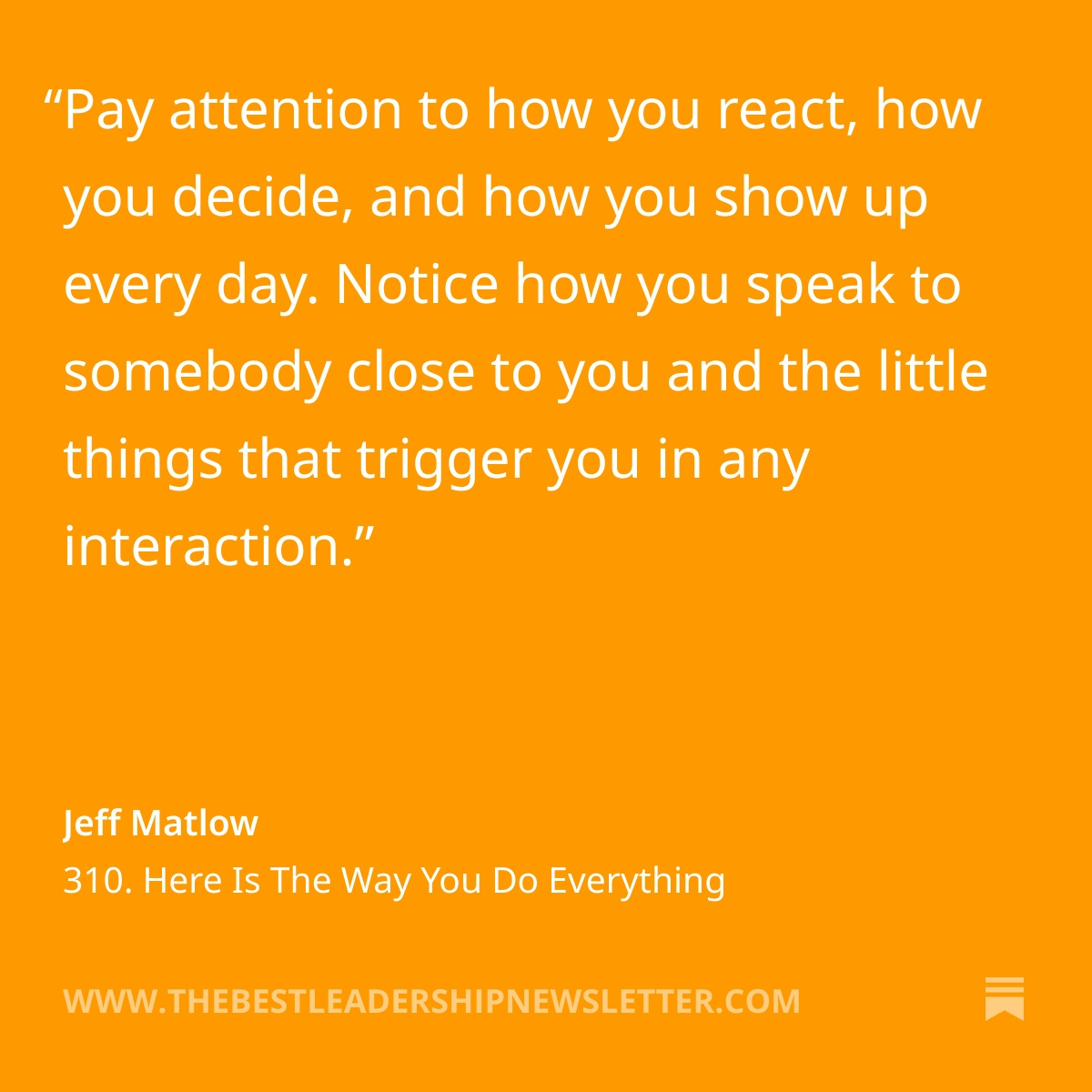Post-Traumatic Growth? Noticing Triggers, When CEOs Look Weaker and More
A quick overview over smart points made this week, plus two new articles with links to helpful points
Welcome to Weekly Finds, from writers, articles and Notes on Substack. I couldn’t include everything “great” I found. Here are this week’s top picks:
We’ve all heard of resilience yet me, I had not heard of the term post-traumatic growth. I assume most all of us have had to suffer, endure and work towards it.
I will go one further and say that you, like me, have succeeded, at least once, through that PTSD with PTG.
This point by Marc “Dewey” Boberg in his newsletter, “Dr. B’s Thoughts on Leadership,” is an important reminder. It is often possible for all of us, in addition to experiencing post-traumatic stress disorder, with assistance of some kind, to experience post-traumatic growth, if not again, then for the first time.
I have a question for you: Do you believe that all of us, always “pays” attention” and “notice” how we react, how we show up, how we speak to somebody close to us and recognize the little things that trigger us?
My observation and opinion is just one yet I don’t see most people doing it. I don’t do it myself as much as I should either.
Jeff Matlow, writing at his Substack newsletter, “The Best Leadership Letter,” is therefore offering us a helpful lesson for our personal development and interactions in the world, including with those more important and most important.
CEOs have full responsibility for the organization but they lack full control.
When things go wrong, you have to absorb that responsibility, even if emotionally you feel like it was someone else’s fault.
CEOs rarely look weaker than when they try to excuse the company’s failures by passing the buck to someone else, whether it’s their team, the market, circumstances, competitors, etc.
Even subtle attempts to minimize your responsibility will show up in bright lights to your employees.
Joel Trammell, writing at Managing the Future
Presidential Principles for the CEO
Trust, relationship strength and reputation matter if you’re a CEO.
What Joel Trammell writes about here in his excellent newsletter, “Managing the Future,” is critical to know, remember and practice, as a habit.
Most CEOs may do this because of their professional and admirable character yet if one asserts that all CEOs do it, well that isn’t true. The news proves it and many of you may also have… stories.
No one desires to experience “the bitterest” yet their thinking and actions (raising my hand here) lead them right into that dangerous, punishing territory.
Reflection and often, yet not always, imitation, are better bets for wisdom and protect you from painful experiences. Of course, wisdom doesn’t have to always hurt and it doesn’t yet it is taught through unwanted experiences too.
Thank you to Nia D. Thomas and her “Knowing Self-Aware Leadership” newsletter for this quote.
Admittedly, this quote required me to think more deeply to understand it or at least, try to grasp the meaning. I finally had my lightbulb moment.
Of course, reality isn’t always logical or reasonable. Many years ago I read and later heard that people almost always have reasons for what they do and even though those actions make no sense at all to us, they did make some sense, distorted, to them.
Fiction, Clancy, the writer, insisted, to be believable in the readers’ minds, had to be reasonably logical for it to be credible to them, to inspire them to continue investing time and thought in the work that he produced.
Point? People can leave us stunned with what they are doing, have done or are thinking about doing. It’s illogical, unreasonable and worse at times. We will fight occasionally to make sense of it, yet it is near impossible, because as we know, it doesn’t and will never make sense.
Published this week at Communication Intelligence:
Preparing for Next-Level Leadership Role
"You should always look out and take notes as you watch senior leaders, decide if something they say or do is something you would say or do if you progress to that level."
Getting Communication Timing Right
…the art of successfully communicating is not just about you. It’s also about the other people involved in the conversation. What may be the right time for you may not be the right time for them.”
Keeping this in mind and adjusting for it can create improved interactions.
"When you consciously select your timing, you put your emotional intelligence to work to actively foster connection, elevate trust and support decision-making,” Gibbings wrote.
and
“If you sense resistance or discomfort, take a step back instead of pushing forward,” recommends says Jameca Woody Cooper, PhD, a board-certified counseling psychologist, who helps adults with communication issues.
“Also, asking, ‘Is now a good time to talk about something important?’ can go a long way. This respects the other person’s boundaries and gives them agency in the conversation.”









